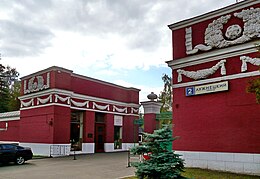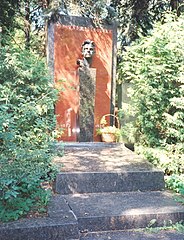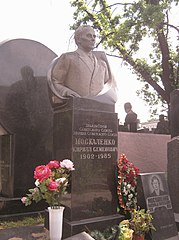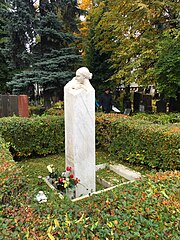Novodevichy Cemetery
| Novodevichy Cemetery | |
|---|---|
Новодевичье кладбище | |
 | |
 | |
| Details | |
| Established | 1898 |
| Location | |
| Country | Russia |
| Coordinates | 55°43′29″N 37°33′15″E / 55.72472°N 37.55417°E |
| Size | 7.5 hectares (19 acres) |
| No. of interments | 26,000 |

Novodevichy Cemetery (Russian: Новодевичье кладбище, romanized: Novodevichye kladbishche) is a cemetery in Moscow. It lies next to the southern wall of the 16th-century Novodevichy Convent, which is the city's third most popular tourist site.[1]
History
[edit]The cemetery was designed by Ivan Mashkov and inaugurated in 1898.[2] Its importance dates from the 1930s, when the necropolises of the medieval Muscovite monasteries (Simonov, Danilov, Donskoy) were scheduled for demolition. Only the Donskoy survived the Joseph Stalin era relatively intact. The remains of many famous Russians buried in other abbeys, such as Nikolai Gogol and Sergey Aksakov, were disinterred and reburied at the Novodevichy.
A 19th-century necropolis within the walls of the Novodevichy convent, which contained the graves of about 2000 Russian noblemen and university professors, also underwent reconstruction. The vast majority of graves were destroyed. It was at that time that the remains of Anton Chekhov were moved outside the monastery walls. His grave served as the kernel of the so-called "cherry orchard" – a section of the cemetery which contains the graves of Konstantin Stanislavski and the leading actors of his company.
Interments
[edit]During the Soviet Union, burial in the Novodevichy Cemetery was second in prestige only to burial in the Kremlin Wall Necropolis.[citation needed] Among the Soviet leaders, Nikita Khrushchev and Mikhail Gorbachev would be buried there.[3] Since the fall of the Soviet Union, the Kremlin Wall is no longer used for burials and the Novodevichy Cemetery is used for only the most symbolically significant burials. In 1997, former premier Nikolai Tikhonov was buried in the cemetery at state expense (since he didn't have any money of his own).[4] In April 2007, within one week both the first President of the Russian Federation Boris Yeltsin and cellist Mstislav Rostropovich were buried there.[5]
Today, the cemetery holds the tombs of Russian authors, musicians, playwrights, and poets, as well as famous actors, political leaders, and scientists.[6][7] More than 27,000 are buried at Novodevichy. There is scant space for more burials. A new national cemetery is under construction in Mytishchi north of Moscow. Notable burials include Dmitry Shostakovich, Sergei Prokofiev and Anton Chekhov.[3]
The cemetery has a park-like ambience, dotted with small chapels and large sculpted monuments. It is divided into the old (Divisions 1–4), new (Divisions 5–8) and newest (Divisions 9–11) sections; maps are available at the cemetery office.[8]
Monuments
[edit]-
Sergei Prokofiev and his wife Mira Mendelson
Notable graves
[edit]The following noteworthy graves, among others, can be found at Novodevichy Cemetery:
1850s
- Nikolai Gogol (1809–1852)
- Sergey Aksakov (1791–1859)
1800s
- Nikolai Rubinstein (1835–1881)
- Maria Trubnikova (1835–1897)
1900s
- Isaac Levitan (1860–1900)
- Vladimir Solovyov (philosopher) (1853–1900)
- Anton Chekhov (1860–1904)
- Ivan Sechenov (1829–1905)
1910s
- Valentin Serov (1865–1911)
- Alexander Scriabin (1872–1915)
- Sergei Taneyev (1856–1915)
- Leopold Sulerzhitsky (1872–1916)
- Vasili Altfater (1883–1919)
1920s
- Pyotr Kropotkin (1842–1921)
- Yevgeny Vakhtangov (1883–1922)
- Valery Bryusov (1873–1924)
- Dmitry Furmanov (1891–1926)
- Yevgeny Berens (1876–1928)
1930s
- Vladimir Mayakovsky (1893–1930)
- Nikolay Andreyev (1873–1932)
- Nadezhda Alliluyeva (1901–1932)
- Eduard Bagritsky (1895–1934)
- Georgy Chicherin (1872–1936)
- Konstantin Stanislavski (1863–1938)
- Boris Shchukin (1894–1939)
1940s
- Mikhail Bulgakov (1891–1940)
- Mikhail Kaganovich (1888–1941)
- Ivan Shadr (1887–1941)
- Vladimir Nemirovich-Danchenko (1858–1943)
- Demyan Bedny (1883–1945)
- Alexander Alexandrov (1883–1946)
- Nikolai Podvoisky (1880–1948)
- Sergei Eisenstein (1898–1948)
- Yevgeniy Abalakov (1907–1948)
1950s
- Vsevolod Vishnevsky (1900–1951)
- Alexandra Kollontai (1872–1952)
- Sergey Merkurov (1881–1952)
- Vera Mukhina (1889–1953)
- Sergei Prokofiev (1891–1953)
- Aleksey Abrikosov (1875–1955)
- Karo Halabyan (1897–1959)
- Boris Lavrenyov (1891–1959)
- Daniil Andreyev (1906–1959)
1960s
- Vsevolod Aksyonov (1902–1960)
- Nadezhda Kolesnikova (1882–1964)
- Nâzım Hikmet (1902–1963)
- Mira Mendelson (1915–1963)
- Ilya Ehrenburg (1891–1967)
- Ivan Agayants (1911–1968)
- Lev Landau (1908–1968)
- Vasily Azhayev (1915–1968)
1970s
- Abram Isaakovich Alikhanov (1904–1970)
- Nikolai Basistiy (1898–1971)
- Sergey Konenkov (1874–1971)
- Nikita Khrushchev (1894–1971)
- Andrey Tupolev (1888–1972)
- Andrei Abrikosov (1906–1973)
- Averky Aristov (1903–1973)
- Yevgeny Vuchetich (1908–1974)
- Vasily Shukshin (1929–1974)
- Yekaterina Furtseva (1910–1974)
- Nikolay Kuznetsov (1904–1974)
- Nikolai Bulganin (1895–1975)
- Dmitri Shostakovich (1906–1975)
- Pyotr Koshevoy (1904–1976)
- Sergey Ilyushin (1894–1977)
- Sergei Lemeshev (1902–1977)
- Roman Karmen (1906–1978)
- Anastas Mikoyan (1895–1978)
- Lyudmila Pavlichenko (1916–1974)
1980s
- Filipp Golikov (1900–1980)
- Nikolai Podgorny (1903–1983)
- Yuri Levitan (1914–1983)
- Nikolai Tomsky (1900–1984)
- Pavel Batov (1897–1985)
- Kirill Moskalenko (1902–1985)
- Vyacheslav Molotov (1890–1986)
- Anatoli Papanov (1922-1987)
- Yakov Zeldovich (1914–1987)
- Arkady Raikin (1911–1987)
- Andrey Kolmogorov (1903-1987)
- Valery Legasov (1936–1988)
- Sergey Gorshkov (1910–1988)
- Andrei Gromyko (1909–1989)
- Kirill Mazurov (1914–1989)
- Valentin Petrovich Glushko (1908-1989)
1990s
- Vasili Kuznetsov (politician) (1901–1990)
- Vasily Margelov (1908–1990)
- Boris Shcherbina (1919–1990)
- Semyon Kurkotkin (1917–1990)
- Matvey Blanter (1903–1990)
- Lazar Kaganovich (1893–1991)
- Yevgeny Ivanovsky (1918–1991)
- Viktor Grishin (1914–1992)
- Grigori Abrikosov (1932–1993)
- Nikolai Ogarkov (1917–1994)
- Yevgeny Leonov (1926–1994)
- Boris Alexandrovich Alexandrov (1905–1994)
- Alexander Shelepin (1918–1994)
- Viktoria Brezhneva (1908–1995)
- Dmitry Shepilov (1905–1995)
- Pyotr Lushev (1923–1997)
- Mikhail Anikushin (1917–1997)
- Nikolai Tikhonov (1905–1997)
- Yuri Nikulin (1921–1997)
- Raisa Gorbacheva (1932–1999)
2000s
- Gherman Titov (1935–2000)
- Sergey Afanasyev (1918–2001)
- Alexander Lebed (1950–2002)
- Lev Kerbel (1917–2003)
- Mstislav Rostropovich (1927–2007)
- Boris Yeltsin (1931–2007)
- Lyudmila Zykina (1929–2009)
- Vyacheslav Tikhonov (1928–2009)
- Yegor Gaidar (1956–2009)
2010s
- Vladimir Arnold (1937–2010)
- Viktor Chernomyrdin (1938–2010)
- Lyudmila Gurchenko (1935–2011)
- Pavel Grachev (1948–2012)
- Victor Merzhanov (1919–2012)
- Galina Vishnevskaya (1926–2012)
- Sergey Sokolov (1911–2012)
- Viktor Kulikov (1921–2013)
- Yevgeny Primakov (1929–2015)
- Lev Durov (1931–2015)
- Vladimir Etush (1922–2019)
- Yury Mikhailovich Luzhkov (1936–2019)
2020s
- Sergei Khrushchev (1935–2020)
- Vladimir Dolgikh (1924–2020)
- Vasily Lanovoy (1934–2021)
- Vladimir Zhirinovsky (1946–2022)
- Mikhail Gorbachev (1931–2022)
- Inna Churikova (1943–2023)
- Vera Vasilyeva (1925–2023)
- Igor Yasulovich (1941–2023)
- Gleb Panfilov (1934–2023)
- Nikolai Dobronravov (1928–2023)
- Ninel Artsimovich (1927–2023)
- Vyacheslav Lebedev (1943–2024)
See also
[edit]- Sainte-Geneviève-des-Bois Russian Cemetery
- Federal Military Memorial Cemetery
- Kremlin Wall Necropolis
- List of burial places of classical musicians
References
[edit]- ^ Vorhees, Mara; Ryan Ver Berkmoes (2003). Lonely Planet Moscow. Lonely Planet. p. 256. ISBN 1864503599.
- ^ "Novodevichy Cemetery". Passport Magazine. April 2008. Retrieved 12 September 2013.
- ^ a b Heintz, Jim (3 September 2022). "Gorbachev buried in Moscow in funeral snubbed by Putin". Associated Press. Retrieved 3 September 2022.
- ^ "Министр СССР: о реформах Брежнев говорил — "не дергайте людей, дайте людям отдохнуть"". ТАСС. Retrieved 2021-03-30.
- ^ Kishkovsky, Sophia (April 30, 2007). "Rostropovich Is Laid to Rest Near Another Russian Titan". New York Times. Retrieved September 3, 2022.
- ^ Roskies, David G. (1999). The Jewish search for a usable past. Indiana University Press. p. 217. ISBN 978-0-253-33505-0.
- ^ Brooke, Caroline (2006). Moscow: a cultural history. Oxford University Press. p. 268. ISBN 978-0-19-530952-2.
- ^ Gilbert, Hillary (2009). Frommer's Moscow Day by Day. Frommer's. p. 192. ISBN 978-0-470-72304-3.

















